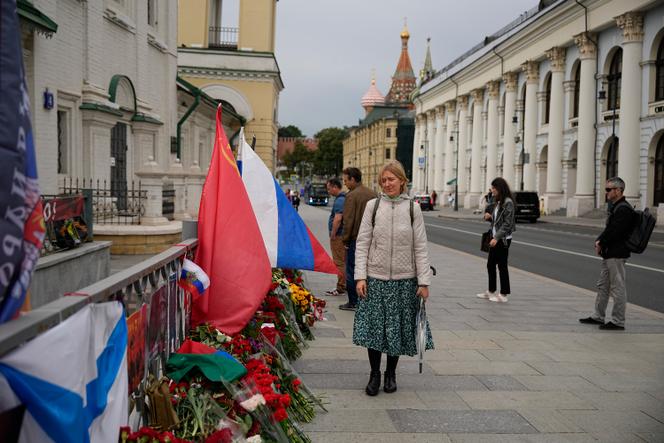


Just off Moscow's Red Square, at the center of an improvised memorial in front of Saint Basil's Cathedral, the three faces form something of a holy trinity. There is Yevgeny Prigozhin, the leader of the Wagner group who died on August 23 in a plane crash, Dmitry Utkin, "Wagner" by his nom de guerre, an admirer of the Third Reich and the founder of the militia who died with his boss, and composer Richard Wagner, who died in 1883. No doubt, the visitor is among peers. In Moscow's center, invaded by Russian tourists and luxury cars, the men who come to pay their respects can be recognized instantly. Big arms, serious faces, combatant looks. Each one adds his own personal touch and tribute: Dozens of flowers, a portrait of a brother-in-arms, a bulletproof vest, a piece of bread on a vodka glass, cigarettes, a unit flag...
On Sunday, August 27, they followed one another in a steady stream – about one every minute, weaving in and out of onlookers, pausing for a few moments, then disappearing without a word, sometimes followed by their wives and children. Some wore T-shirts or caps bearing the group's logo, but discretion was the order of the day. No one was ready to talk about his involvement with the mercenary group. Words were scarce. The pain was sometimes too vivid for these men who idolized their leader. "I don't believe he's dead," said one of them, with a cap and a puffy face. He said he had been coming every day for the past three days. On Sunday, however, an investigation committee finally confirmed the death of Wagner's boss and his cronies five days after the events "following genetic expertise."
There was also mistrust of journalists, especially foreign ones, portrayed as enemies. In Saint Petersburg, the militia's headquarters, an Al-Jazeera journalist was beaten near a similar memorial. Prigozhin was a "hero of Russia," a title officially bestowed on him by Russian President Vladimir Putin for capturing the Ukrainian town of Bakhmut earlier this year. Still, everyone understands he had been in disgrace since his mutiny on June 23-24.
The words "He was a true patriot" and "He spoke the truth," repeated like so many self-evident statements from dozens of mouths, must be understood with a grain of salt. "He," unlike all the others: Corrupt generals, incompetent ministers, members of the elite sheltered in their luxury homes... This was Prigozhin's creed, repeated over and over again by his men and supporters.
"They don't want to win the war," a man wearing the group's T-shirt said. "They're not prepared to make the necessary efforts when they're not outright traitors." A little to the side, the same man agreed to talk about the conditions of his hero's death: "Of course, we understand that it wasn't the Ukrainians or the CIA. But what can we say? The message is clear enough, not to mention Strelkov in prison." Igor Strelkov, whose real name is Igor Girkin, a former military leader of the Donbas separatists and another ultranationalist personality, has been in pre-trial detention since July for "extremism."
You have 40.99% of this article left to read. The rest is for subscribers only.
